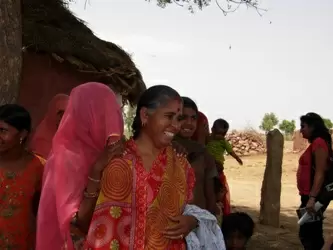Making child births safer through better facilities and education

03-May-2012
Vol 3 | Issue 18
She has assisted in the birth of almost the entire village population. At 65, Charki Devi, a dai or midwife in a Rajasthan village, is happy she has played a pivotal role in birthings. But her role and of those like her is now fading, with hospital deliveries taking over.
In Beh Charan, a village of around 650 people in Osiyan block of Rajasthan's Jodhpur district, dais like Charki and Imrati Devi have undergone training under the government's programme to train midwives towards ensuring safe motherhood.
 |
|
Sandhya Rani Purohit, an auxillary nurse midwife or ANM, (in red sari) in Beh Charan village in Rajasthan's Jodhpur district (Photo: Ranjana Narayan)
|
Both midwives are very careful about hygiene during deliveries.
"We cut our nails, wash our hands carefully, see" Charki Devi told this visiting correspondent, holding out her hands.
Charki has spent 30 years in her profession, while Imrati, who is around 50, has spent 15 years.
Now with most births taking place at institutions, either the primary health care centre or the nearest hospital, women like Charki and Imrati don't play the key role they did, but nevertheless their services are wanted.
They are beckoned at all odd hours to examine pregnant women, and can tell if they require to be immediately rushed to hospital.
"We can also tell if it is going to be a boy or girl, from the food the pregnant woman craves to eat," says Imrati.
If the delivery is at home, then the dai, besides ensuring her own hands are clean, also ensures there is a clean cotton cloth on which the delivery is to take place, a new blade with which to cut the umbilical cord and a piece of thread - boiled and sterilised - to tie up the cut cord.
There were times some years ago when the delivery would take place on a bed of sand or a pan of heated soil. The sand or soil would give the cushioning effect and also soak up the blood.
"These dais are called to accompany the expectant mothers to hospital," says Smita Bajpai, programme officer of Chetna, a NGO working under the White Ribbon Alliance India for safe motherhood.
"The expectant mothers feel more at home with the dais, who are known to them in the village. The dais remain with the women in the hospital, and alert the doctors and nurses when the baby is about to be born," she said.
The dais would earlier get Rs.50 per delivery, but now they don't get anything, Imrati said.
But villagers do give the women some token gifts and food after a successful delivery. The dais are also called on the seventh day after the birth, during the naming ceremony.
Besides the dais, there are also the ANMs or auxillary nurse and midwives, the ASHAs (Accredited Social Health Activists) or trained female community health activist and the Anganwadi workers who work among the women in rural areas of Rajasthan to spread awareness about birth preparedness.
In Rajasthan, which has among the country's highest maternal mortality rates at 335 per 100,000, the midwives and trained nurses play an important role as interface between the families and the health centres.
Sandhya Rani Purohit, in her 50s, is a ANM with around 27 years of experience working in Beh Charan village.
Trained under the National Rural Health Mission, Sandhya takes the blood pressure readings of the pregnant women, checks their weight, gives them their tetanus "tika" or shots, and also advises the women on family planning methods.
"I monitor the health of all the women between the ages of 15 to 45. I check the mother and child and advise women to go for delivery to hospital," says Sandhya.
There is also Shyam Kumari, an anganwadi worker in the same village.
"Earlier, births in our village used to take place at home. Now all the women are sent to hospital. We also advise them on their diet and monitor their health closely," says Shyam.
Aparajita Gogoi, country director CEDPA (the Centre for Development and Population Activities), which helped form the White Ribbon Alliance India, said that the aim was to make childbirth safer "We work at multiple levels - both at awareness generation level and at the community level."
A select group of mediapersons visited some villages of Rajasthan's Jodhpur district to view the results of a project coordinated by SUMA-Rajasthan White Ribbon Alliance for Safe Motherhood, in partnership with White Ribbon Alliance India and GRAVIS (Gramin Vikas Vigyan Samiti). - IANS














